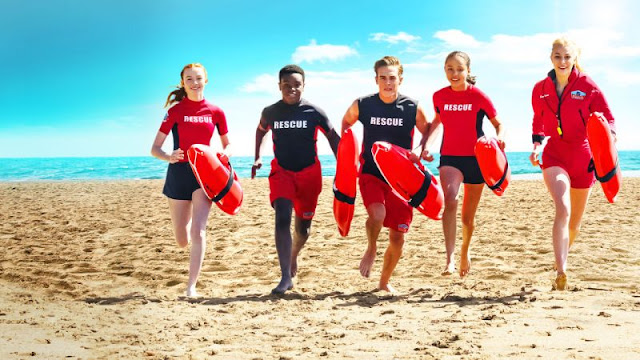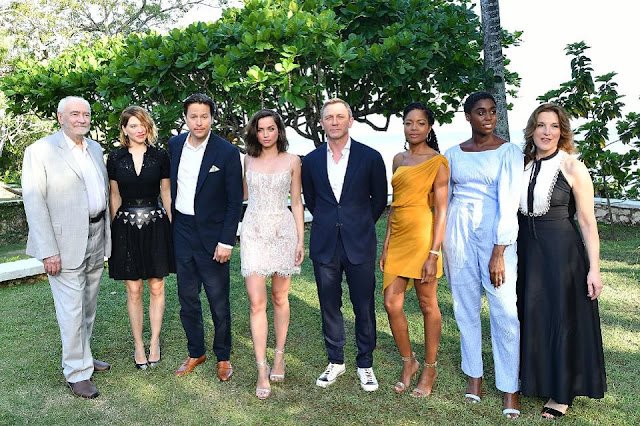Netflix's 'Malibu Rescue' Uses Pixar's Marketing Model Very Successfully
Malibu Rescue: The Next Wave shows us why the unique format of Netflix's lifeguard show (inspired by Pixar's marketing strategy) makes it a potential pioneer in Television
 |
| The cast of 'Malibu Rescue: The Next Wave' (CREDIT: Netflix) |
by Jack Linsdell
Netflix is treating us this week. Along with new "sure to be popular" films like Sabrina Carpenter's Work It, the streaming service is also dropping new seasons for some of their best original (Trinkets) and acquired (Good Girls) shows. But, as excited as I am for those, perhaps their most under-the-radar new release this week is Malibu Rescue: The Next Wave. This feature-length special is part of Savage Steve Holland and Scott McAboy's Malibu Rescue series, a sort of "Baywatch but for kids" lifeguard comedy. Although primarily a "for kids" show, with age-appropriate humour, action and storylines, Malibu Rescue somehow hits home with an older audience, in a way most Pixar toons do. Talking of Pixar, and the reason Malibu Rescue works so well is that it shares a similar marketing model with the animation giant.
Malibu Rescue, fronted by School of Rock star Ricardo Hurtado and Breanna Yde (two of Nickelodeon's brightest "stars"), follows a misfit crew of aspiring Junior Lifeguards as they navigate their way through adolescence and the prestigious Malibu Rescue training programme. For a kid-targeted show, it's actually very engaging, and works brilliantly as aggressively "fun" entertainment for adults too, in a way that it really shouldn't. The show is harmless enough in it's content to feel like kid-friendly escapism, but features enough real-world subtext (that younger kids would miss) to provide sophisticated entertainment for adults/parents too. If you have kids, I'd recommend this as a good show you can watch with them.
Anyway, back in May 2019, Netflix dropped Malibu Rescue - The Movie, a sort of feature-length prologue to the main series. This was one of the most surprising "I shouldn't like this but I do" discoveries on the streaming platform last year. It introduced us to all the main characters and their "world", as well as setting up all the major storyline strands that would become the backbone of the show. However, this was all wrapped in a light, self-contained and fun package that the movie itself provided entertainment on it's own merit.
One month later, and riding on the (limited) buzz from the first special, Netflix released the first season of Malibu Rescue. The eight episode series (each one running at approximately 25 minutes) picked up from the events of the special, allowing the writers to dive head first into the heart of the main story from the offset. Because everything had been set up in the special, the series didn't have to spend three episodes doing that. Saying that, the series is self-contained enough that you can still enjoy it without having seen the special. The series itself is a funny and charming coming-of-age story, taking the best bits of the Baywatch TV show ("hot" leads, tropical location, lots of tense rescues) but remaining universally appealing and kid-friendly (unlike the sexually promiscuous and very adult David Hasselhoff/Pamela Anderson show). And, this brings us to the latest entry, another feature-length special, The Next Wave that acts as a self-contained sequel to series one and (presumably) a set up for season two.
This "feature-length special followed by series" structure makes Malibu Rescue a very unconventional and unique show. It uses it's "like a film" specials to act as little teasers/set ups for the next season, whilst still giving fans something whilst they wait for the next block of episodes to be filmed. And, this is very similar to what the likes of Pixar having been doing with their toon franchises for years. For their immensely popular and well-liked Toy Story franchise, Pixar produced a series of short films to keep (and generate) publicity for their next feature film. After Toy Story 2 smashed it at the box office in 2010, Pixar produced the short films Hawaiian Vacation, Small Fry and Partysaurus Rex in 2011/2012 to keep the franchise in the public domain. Illumination did a similar thing with it's Despicable Me series, producing 14 shorts to supplement the release of each Despicable Me and Minions movie over the years. Heck, even Universal used the same trick after the "dinosaurs are free" cliffhanger of Jurassic World: Fallen Kingdom, with Collin Trevorrow making the 8 minute short Battle At Big Rock to act as a "while you wait" teaser between the JA Bayona flick and Trevorrow's upcoming Dominion blockbuster.
What has worked for Pixar, Illumination and Universal, is also working for Netflix. Okay, the format may be slightly different, but Malibu Rescue is using it's feature-length specials like Pixar uses short films, and it could be revolutionising TV. The upside to that template is that using specials as proverbial short films, is a smart way to keep the franchise in the public's attention, and also increases it's chances of being discovered by "new" viewers. Although the specials (like Pixar's shorts) are interconnected with the main event (TV show = feature film), they are self-contained enough to allow new audiences to get hooked into the franchise without needing to catch up on hours of content. And, The Next Wave is a smart way to keep Malibu Rescue in the public domain while we wait for a second season. It also has the benefit of driving hype and publicity for the upcoming new installment of that franchise, whilst satisfying an impatient fanbase who is craving something now.
I'd be interested to see if this revolutionary format can be applied to other (more mainstream) shows on the likes of Netflix, because it is certainly an effective and cheaper way to market a TV show. It also means that instead of waiting for the next season to drop in a year's time, audiences are fed a bitesize chunk sooner to wet (and fulfil) their appetite. Plus, the whole "film to series to film" format also brings variety into long-form TV shows, mixing up style, length and budget so it doesn't become repetitive. On it's own merit as well-done, kid-friendly entertainment Malibu Rescue is a big (and surprising) success. However, it's potentially pioneering series format proves that what works for Pixar features could also work for Netflix series too.


Comments
Post a Comment